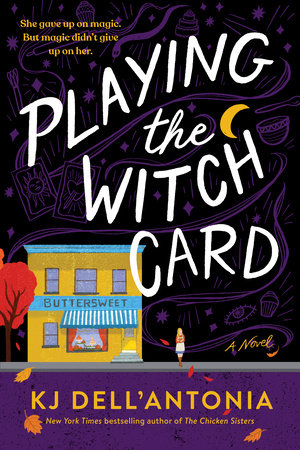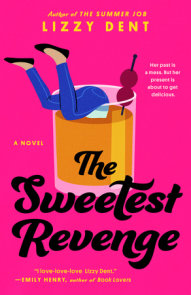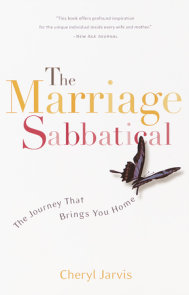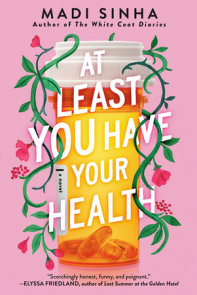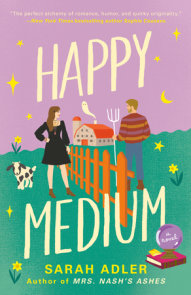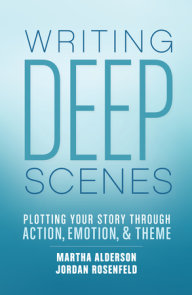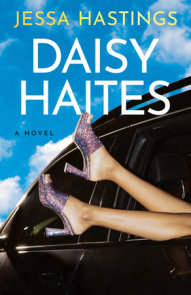READERS GUIDE
A Conversation with KJ Dell’AntoniaYou mention in your acknowledgments that you have a long relationship with tarot, and that you conducted extensive research on tarot cards and witchcraft while writing this novel. Did any of this research change your thoughts on tarot or inspire you to change something about your life?
The cards in the story don’t foretell destiny, and they don’t make things happen. They reveal possibilities. Because they’re Flair’s family’s magic cards, with the spirit of that magic within them, they know a little more than most cards—but Flair still has to read her own story.
Figuring out the role tarot cards played in Flair’s life—even though they’re magic cards, and even though she’s a witch—made me realize that what I love about the cards is the way they offer real-life readers that same possibility. We can see where we are in our own stories, decide what certain symbols—or events or people—mean to us. We can use them to open our minds to different paths forward. The Death card, for example, isn’t necessarily the end of a story but might be an end to a particular way of viewing a situation. And when we try to force something—attach the Lovers card to a relationship that isn’t working, for example—it doesn’t help. We have to let the cards fall where they fall and read our story from there—even when we go to someone else to read the cards, we’re always the only one who can really see the story.
Recipes are an important part of both Flair’s and Jude’s professions, and cooking was also a vital element in your novel The Chicken Sisters. How do you think cuisine relates to intimacy and to family legacy?
Food is so omnipresent in our lives. Whether we’re eating with our family in the big bustling kitchen we romanticize, or eating with a roommate or lover, or alone when we thought we’d be with someone, it’s the one waking activity that everyone does one way or another. Eating has rhythms, routines, expectations, and associations whether we mean to create them or not, and so when it does connect us to our people it’s powerful. It’s very challenging to control how our own history with food impacts us and our families, so I love exploring that relationship in fiction where I can watch it play out.
Which tarot card would you most like to receive at this moment in your life and why?
Is there a Taylor Jenkins Reid card? No, seriously—I’ll give a real answer! I love the forward motion of the Chariot and the Wheel of Fortune. And Temperance gets a bad rap—it’s really about finding balance, not giving things up. And who doesn’t love the way the Magician tells us we are right where we want to be and invites us to do all the things?
But the whole point is that we don’t choose. Choosing doesn’t work (although it’s fine to try to invite a card’s energy into your life). We take a card we’ve been dealt and we ask ourselves what it says about where we are in our story.
What do you think draws Jude and Flair to each other? Why is their connection so powerful?
I think they’re “fated mates” in Romance terms—everything about their history brings them together. No one else will ever understand how they became who they are. Which in real life could be good or bad (sometimes we need to become someone else), but because Flair and Jude both need to really lean into things they’ve avoided about themselves and their pasts, they’re perfect together. They’re not going to let each other off the hook, but they’ll also be able to laugh about it.
Which was your favorite scene to write for this book, and why?
Probably the circle where they’re trying to free David from his enchantment. They know what they’re doing seems crazy and yet they also take it very seriously. I also loved creating the world of the Rattleboro trail, because we had, at our house, an annual outdoor “Spooky Trail,” where parents haunted the woods to scare the pants off our children, and I could never get the effects as extreme as I wanted. There were always naysayers, insisting that we couldn’t do things like dropping nets onto them, and my inability to get serious special effects out there was always disappointing. But when you’re making it up, you can do anything!
Playing the Witch Card is your third novel. How was writing Playing the Witch Card similar to or different from writing your previous books? How do the themes of Playing the Witch Card overlap with themes you’ve explored in your other novels?
The Chicken Sisters was about how reality TV—or really, fame and external approval—never solves anything. In Her Boots was about how hiding your real self also never fixes anything. And in Playing the Witch Card, I was thinking about how even magic can’t solve your problems. Nothing solves our problems. We have to do the work ourselves.
There are many unexpected twists and turns in this novel. Without giving anything away, did you envision all of these when you started writing, or did some of them occur to you as you progressed through the chapters?
Things changed a lot while I was writing. I always knew the deep town history and that the original founding witches very much disagreed about how to pass their knowledge to future witches (how’s that for not giving anything away!). I also knew what Flair would have to confront at the end, both in terms of the plot and what’s at stake, and in terms of her internal struggle with her own powers. But the details of how it happened definitely evolved. I changed the ending at the last minute, too.
What do you most want readers to take away from Playing the Witch Card?
I wrote Playing the Witch Card at a moment in my life when I was trying to come to terms with how little control we have over so many of the things that are important to us. I found myself realizing that even if you could control everything, you wouldn’t want to, because in so many ways it’s the unexpected that makes life interesting. Even the worst things at least give us an appreciation for the good stuff. I wanted Flair to realize that while she could control her own choices, she didn’t actually want to control Lucie’s—or Jude’s, or David’s, or even her mother’s, even if that meant her life wouldn’t go the way she planned.
I’ve finally realized that even if I could wave a magic wand and make everything perfect for everyone I love, it wouldn’t work—because perfect for me isn’t perfect for them, especially if they don’t get to make their own choices. Which doesn’t mean I don’t still wish I could do it. But I’ve mostly accepted it, and I hope reading Playing the Witch Card nudges readers along that same path.
Discussion Questions
This book explores themes of family and legacy. Flair is often known as “Marie’s granddaughter” or “Cynthia’s girl.” Which identities have you inherited from your family, and what do they mean to you?
If you were to take over the line of work or the daily routine your grandmother was doing at your age, what would that be and how well would you accomplish it?
To what extent does believing in magic affect one’s powers? Do you think Flair could summon up magic if she continued not to believe in it? How is magic a metaphor for female confidence?
The women in Rattleboro clearly believe magic is limited to other women. At one point, Josie suggests it’s because men don’t need magic. But in the final scenes of the book, Jude is showing signs of discovering his own powers. How do you think his having magic will affect his relationship with Flair and with Renee?
Magic is often pitted against stability in Flair’s mind. Did you think that these concepts were at odds at the beginning of the novel? Did your opinion change as you read further?
Why do you think Cynthia named her daughter “Flair”?
Multiple generations of mothers and daughters are shown in this novel. Compare these mother-daughter relationships: Marie and Cynthia, Cynthia and Flair, and Flair and Lucie. How do they contrast and inform one another?
Flair tragically underestimates Lucie at points in the novel. How might she have handled Lucie’s tarot education differently? How do you think that would have affected the outcome of the book?
Who did you think was the primary antagonist of this novel at first? Did your opinion change as the story progressed?
There are very few men of import in Rattleboro, by design. How does this change the roles of the women running the town? Can you imagine the way your town would change under such matriarchal power?
Have you ever had your tarot cards read? Would you? Did this story affect your answer?
Do you think we each have a fate or destiny that could be “read in the cards”? Or do we control our own stories?
The book’s dedication asserts that the all-important question is: “Are you a witch or not?” Having read the book, what do you think “being a witch” means in the context of the story? More important, are you a witch?







